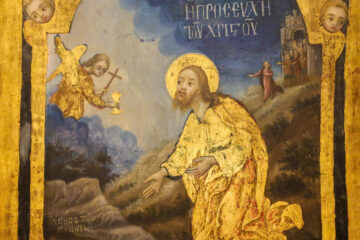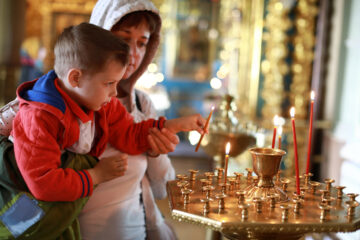I used to think it unfair that women got the dirtiest jobs.
I know women who have had a baby boys pee in their faces during a diaper change. I know women who have had young children vomit in their laps. I myself have caught the vomit of a laboring woman into a plastic bowl while swallowing back my own sympathetic contracting stomach. Women give birth with blood. Children skin their knees and run first to their mother. Women cannot afford the luxury of feeling queasy at the sight of blood.
Life is messy, bloody, and sometimes even full of squalor.
What I didn’t understand as a brazen teenager was the love underlying all these messy tasks. These aren’t duties or chores (at least not completely);.These are acts of service. These are acts of love.
For centuries women have been nurses and midwives. We are the first to greet life, and often, the last to watch life fail. I have held the hand of my mother and sung hymns while she passed from this life into the next. In America today, preparing a body for burial has largely been relegated to professionals, but this too has been the traditional purview of women.
At the foot of the cross stood the women. Eight women are identified as the Myrrh-Bearers: Mary Magdalene, the Theotokos, Joanna, Salome, Mary the wife of Cleopas, Susanna, and Mary and Martha of Bethany, Lazarus’s sisters. These Myrrh-Bearers watched the unbearable. They watched the Creator of Life breathe his last.
The verses of the Holy Saturday Lamentations (generally sung Good Friday evening) poetically proclaim their mourning. In verse, the Theotokos cries, “I am rent with grief and my heart with woe is torn and broken as I see Thee slain unjustly, O Word of God . . .”
The women are given verse to mourn, “In a grave they laid Thee, O my life and my Christ . . .” while the whole church and all of creation is invited to sing “a dirge hymn to honor our Creator.”
Another verse recalls the actions of the Myrrh-Bearers: “Women bringing spices came with loving forethought . . .” The reason for their steadfastness is told: “loving forethought.” The Gospel of John reports that Mary Magdalene was so devoted that after the Sabbath, she arose and went to the tomb “while it was still dark.” Luke the Evangelist confirms that it was “very early in the morning.” The mother of a newborn will wake throughout the night to nurse her baby. Time of day doesn’t matter in the face of devotion.
Apart from the Theotokos, the myrrh-bearing women weren’t kin to Christ, although Salome was the daughter of St. Joseph the Betrothed, or in other words, the Virgin Mary’s step-daughter. There was no cultural expectation for them to keep Vigil as he died or to care for his body. They didn’t wake up early and go to the tomb because it was the “woman’s job.” The verses of the Lamentations are full of tender endearments: “O my Life and my Christ,” and “O my dear Christ Jesus.” The Theotokos calls him, “O my Jesus, my Beloved and Desired One!” The women stayed at the foot of the cross out of love, not duty. They prepared the burial spices with care.
The cultural voices which spoke to me as a teenager scorned wiping feces, cleaning vomit, changing bandages, and doing other so-called ‘dirty’ caretaking tasks. They missed the essential ingredient. They didn’t understand Love.
The Theotokos is our first model of womanhood for her humility, purity, and obedience. The Myrrh-Bearing Women are another for their courage, forethought, steadfastness, and above all, love.
These Holy Myrrh-Bearers waited at the foot of the Cross, witnesses to a grisly scene. They watched our Life-Creating Lord taste death. Like the wise virgins with oil, they prepared with forethought and assembled the burial spices. They awoke early, while it was still dark.
Not because it was “woman’s work.”
But out of love.
I honor Joanna, Salome, Susanna, the other Mary (the wife of Cleopas), Mary Magdalene, and Mary and Martha of Bethany, and of course the Theotokos, for their examples of loving service. I hope to learn how to give of myself with that kind of love.
I take comfort because we learn from Christ himself. The verses of the Good Friday Lamentations tell us that He amazed the angels with his “submissive love.”
Alleluia.
ABOUT THE ORTHODOX CHRISTIAN NETWORK
Orthodox Christian Network (OCN) is a 501(c)3 and an official agency of the Assembly of Canonical Bishops of the United States of America .It is a recognized leader in the Orthodox Media field and has sustained consistent growth over twenty-two years. We have worked to create a community for both believers and non believers alike by sharing the timeless faith of Orthodoxy with the contemporary world through modern media. We are on a mission to inspire Orthodox Christians Worldwide. Click to signup to receive weekly newsletter.
Join us in our Media Ministry Missions! Help us bring the Orthodox Faith to the fingertips of Orthodox Christians worldwide! Your gift today will helps us produce and provide unlimited access to Orthodox faith-inspiring programming, services and community. Don’t wait. Share the Love of Orthodoxy Today!



0 Comments